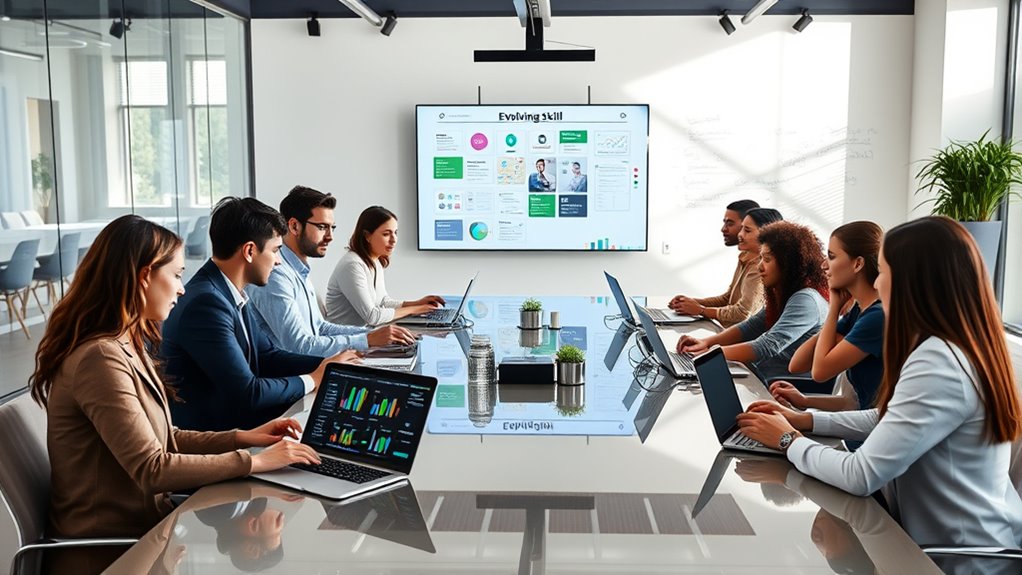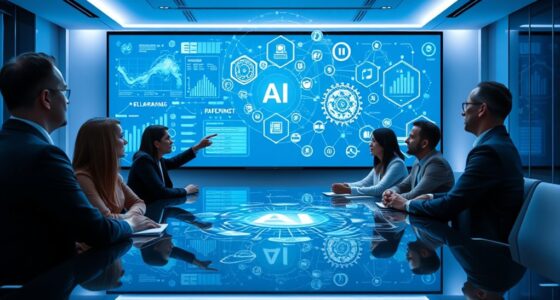To stay competitive in today’s workplace, you need to prioritize upskilling and continuous learning. Embracing new technologies and industry standards helps you keep your skills relevant and boost your confidence. Using digital tools like online courses and webinars makes learning flexible and engaging. By actively updating your skills, you demonstrate adaptability and dedication, which can open doors to new opportunities. Keep exploring this topic further to discover how ongoing growth benefits your career and organization alike.
Key Takeaways
- Embracing upskilling and continuous learning ensures employees stay relevant amid technological and industry changes.
- Leveraging digital tools and platforms makes skill development more flexible, engaging, and efficient.
- Integrating new technologies enhances productivity, confidence, and fosters a culture of innovation within organizations.
- Ongoing learning prepares employees for future roles, promoting adaptability and long-term career growth.
- A commitment to continuous education demonstrates resilience and aligns individual skills with evolving organizational needs.

In today’s fast-changing job market, staying relevant means embracing upskilling and continuous learning. You need to keep pace with evolving technologies and shifting industry standards to remain competitive. When you commit to learning new skills, you not only boost your personal growth but also increase your value within your organization. This proactive approach enhances your employee motivation because it demonstrates your dedication to self-improvement, which can inspire others around you as well. Companies that prioritize ongoing training often see higher engagement levels, as employees feel more empowered and invested in their roles.
Technology integration plays a vital role in this process. By leveraging new tools and digital platforms, you can access a wealth of knowledge that makes learning more engaging and efficient. Online courses, webinars, and e-learning modules allow you to acquire skills at your own pace, fitting training into your busy schedule. These technological resources also facilitate interactive learning experiences, such as virtual simulations or collaborative projects, which deepen understanding and retention. As you become more comfortable with integrating technology into your skill development, you’ll find yourself better equipped to adapt to digital transformations within your workplace.
Moreover, embracing technology integration in upskilling efforts often results in immediate practical benefits. For instance, learning how to use advanced data analytics tools or automation software can directly improve your productivity and decision-making. As you develop these technical competencies, your confidence grows, making you more motivated to pursue further learning opportunities. Employers recognize this proactive attitude, which can lead to increased responsibilities or career advancement. When you actively seek out ways to incorporate new technologies into your daily tasks, you contribute to a culture of innovation, encouraging your colleagues to follow suit.
It’s important to remember that continuous learning isn’t just about acquiring skills for your current role—it’s about preparing for future opportunities. By staying curious and open to change, you foster a mindset that values growth and adaptability. This mindset keeps your employee motivation high because you see learning as an ongoing journey rather than a one-time task. As you embrace new challenges and integrate emerging technologies into your work, you’ll find that your ability to navigate change becomes a significant asset, both for your personal development and for your organization’s success.
Additionally, understanding the importance of predictive modeling in educational data mining can help you anticipate industry trends and adapt your skills accordingly, ensuring you remain competitive in a rapidly evolving landscape. Ultimately, staying relevant in today’s job market requires a commitment to upskilling and continuous learning, with a focus on technology integration. By doing so, you not only enhance your skill set but also demonstrate your adaptability, resilience, and enthusiasm for growth—qualities that employers prize highly in an ever-evolving workplace landscape.
Frequently Asked Questions
How Can Small Businesses Implement Effective Upskilling Programs?
You can implement effective upskilling programs by starting mentorship programs that pair experienced employees with newer staff, fostering leadership development. Encourage your team to pursue relevant training and workshops, and set clear goals for skill growth. Keep the programs engaging and practical, ensuring employees see tangible benefits. Regularly assess progress and adjust initiatives accordingly, creating a culture that values continuous learning and leadership growth within your small business.
What Are the Best Online Platforms for Continuous Learning?
You should explore online platforms like Coursera, Udemy, and LinkedIn Learning, which align with current e-learning trends. These platforms offer courses that help you conduct skill gap analysis, ensuring you focus on the most relevant skills. They provide flexible learning options, allowing you to upskill efficiently. By leveraging these platforms, you stay updated, bridge skill gaps, and continuously grow your expertise in a rapidly changing work environment.
How Do You Measure the ROI of Upskilling Initiatives?
You can’t manage what you don’t measure, so start by tracking training impact through performance metrics and productivity improvements. To evaluate skill valuation, compare pre- and post-training outputs, and assess how upskilling aligns with business goals. Use feedback and key performance indicators to quantify ROI, ensuring your initiatives generate tangible results. This way, you turn investment into growth, proving that continuous learning truly pays off.
What Skills Will Be Most in Demand in the Next Five Years?
You’ll find that skills related to emerging technologies like AI, machine learning, and data analytics will be most in demand over the next five years. As future job trends evolve, adaptability and digital literacy become essential. Developing expertise in cybersecurity, cloud computing, and automation will position you ahead of the curve. Staying current with these technological advancements guarantees you remain competitive and ready to meet the shifting landscape of work.
How Can Employers Motivate Employees to Engage in Lifelong Learning?
You can motivate employees to engage in lifelong learning by fostering a strong learning culture through motivational strategies like recognition, rewards, and growth opportunities. Encourage autonomy and curiosity, showing how their development benefits both them and the organization. Provide accessible resources and regular feedback. When employees see learning as valuable and supported, they’ll be more inclined to actively pursue continuous growth, ultimately boosting their engagement and performance.
Conclusion
By embracing upskilling and continuous learning, you stay adaptable and competitive in today’s fast-changing workplace. Did you know that 87% of employees and executives say that a lack of training and development opportunities hampers retention? Investing in your growth not only boosts your skills but also increases your value to the organization. Keep learning, stay curious, and you’ll be better prepared for future opportunities and challenges ahead.









